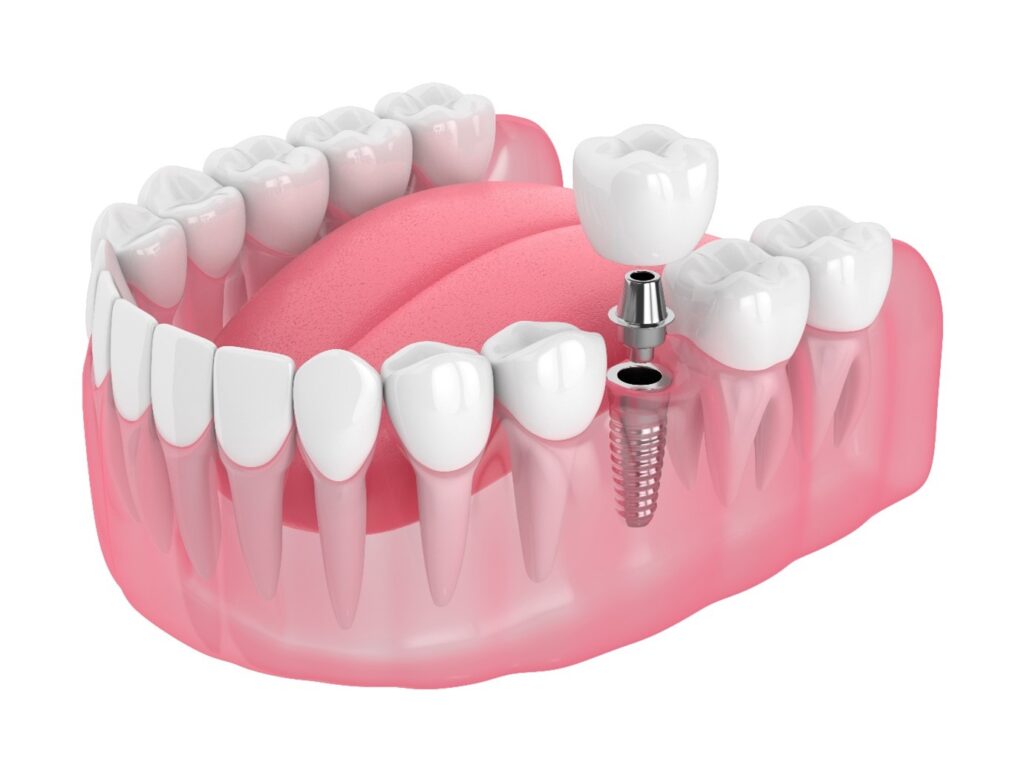Dental implants are advanced solutions for people who have lost teeth due to injury or disease.
What Are Dental Implants?
Dental implants are artificial devices surgically placed into the jawbone to replace missing teeth. They restore both the function and appearance of the lost teeth, offering a long-lasting solution for tooth replacement.
A dental implant system generally consists of three parts:
- Implant Body: Surgically placed in the jawbone to replace the root of a missing tooth.
- Abutment: A connector that extends from the implant and holds the replacement tooth (crown).
- Artificial Teeth (Crowns/Bridges): The visible portion of the implant system that mimics natural teeth.
Dental implants provide support for crowns, bridges, or dentures, significantly enhancing the patient’s ability to chew, speak, and smile naturally.
What Are the Benefits and Risks of Dental Implants?
Benefits of Dental Implants:
- Restores Chewing Function: Dental implants enable you to chew and eat with ease and comfort.
- Enhances Appearance: They are designed to look like natural teeth, improving your smile and boosting your confidence.
- Prevents Jawbone Deterioration: Implants help maintain bone structure in the jaw, preventing bone loss that often occurs after tooth loss.
- Protects Adjacent Teeth: Unlike bridges, dental implants don’t require reshaping or altering surrounding teeth.
- Boosts Quality of Life: Implants contribute to better speech, comfort, and overall well-being.
Risks and Complications:
- Damage to Surrounding Teeth: There’s a risk of damaging nearby teeth during implant placement.
- Infection: Infections may occur in the gums or bone around the implant.
- Implant Failure: In certain cases, the implant may fail due to loosening, infection, or slow healing.
- Nerve Damage: The surgical procedure may result in temporary or permanent numbness or nerve damage.
- Cleaning Challenges: Proper cleaning around the implant is essential to prevent gum disease or plaque buildup.
- It is important to consult with your dentist to carefully evaluate the risks and benefits, ensuring dental implants are the right option for you.
Who Should Consider Dental Implants?
Dental implants are ideal for patients who have lost one or more teeth and are in good overall health. However, not everyone is a candidate for implants.
Ideal candidates for dental implants include those who:
- Are generally healthy and can withstand minor surgery.
- Have sufficient bone density in the jaw to support the implant.
- Do not have uncontrolled health conditions (e.g., diabetes or heart disease) that could interfere with healing.
Patients who should consult their dentist before choosing dental implants include those who:
- Smoke, as smoking can impair healing and increase the risk of implant failure.
- Have active gum disease or poor oral hygiene habits.
- Have insufficient bone structure in the jaw, which may require bone grafting.
Before proceeding with dental implants, it’s crucial to have a thorough evaluation by a dental provider who will assess your medical and dental history.
How Are Dental Implants Placed, and What Is the Recovery Process?
Placement Procedure:
- Step 1: Consultation and Planning: Your dentist will assess your overall health, examine your jawbone, and take X-rays to determine the appropriate placement for the implant.
- Step 2: Surgical Implantation: The implant body is surgically inserted into the jawbone. This process can be done under local anesthesia, and the gum is stitched over the implant.
- Step 3: Healing and Integration: The healing process, known as osseointegration, involves the bone growing around the implant, which can take several months.
- Step 4: Abutment Placement: Once the implant is fully integrated, an abutment is placed to support the crown or artificial tooth.
- Step 5: Final Restoration: The final artificial tooth (crown) is placed on the abutment.
Recovery:
Early Recovery: The first phase of recovery after implant surgery usually includes swelling, discomfort, and a requirement to follow a soft-food diet. Complete healing of the implant site may take between 3 to 6 months.
- Long-Term Care: After recovery, it’s essential to maintain good oral hygiene to prevent infection and ensure the implant remains secure. Regular follow-up visits to your dentist are necessary to monitor the implant’s status.
How Are Dental Implants Evaluated for Safety?
Dental implants are carefully evaluated for safety through a series of standardized tests. The materials used, such as titanium or zirconium, are biocompatible and have been tested for their ability to integrate with the bone without causing adverse reactions.
The FDA requires that dental implant manufacturers demonstrate that their systems are as safe and effective as those already available on the market. These systems undergo extensive testing, including:
- Biocompatibility Testing: Ensures that the materials do not cause allergic reactions or irritation.
- Mechanical Testing: Tests the durability and strength of the implant under various conditions.
- Clinical Studies: Manufacturers conduct studies to ensure the implant’s success rate and safety profile.
The safety of dental implants is constantly monitored, and problems should be reported to the FDA through MedWatch, the FDA’s safety program for adverse events.
Contact AMVI Clinic for Your Dental Implant Consultation
If you’re considering dental implants, the team at AMVI Clinic is here to guide you through the process. We offer personalized consultations to assess your needs, explain the procedure in detail, and provide the best solutions tailored to your dental health.
Contact AMVI Clinic today to schedule your consultation and restore your smile with dental implants!

